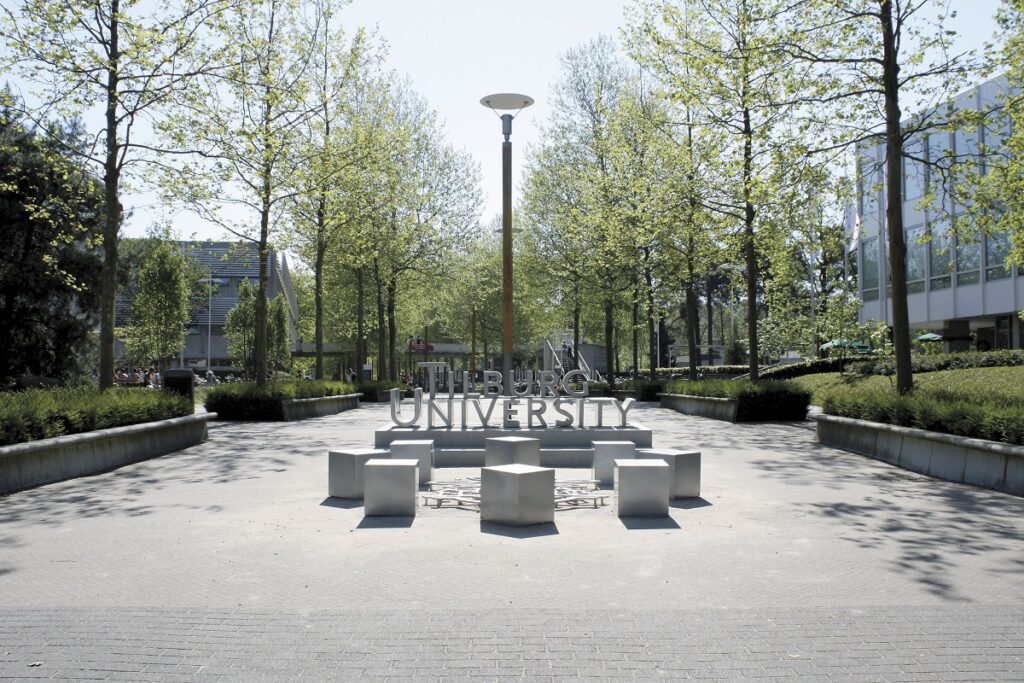‘Academic freedom under pressure at Tilburg University’
Academic freedom at Tilburg University is under pressure, argue staff members Yvette Drissen, Rosanna Anderson, Sean Smith, and Michiel Bot in a letter to the editor, following the removal of a poster from an office door. ‘The removal of the poster goes against everything the Executive Board and Tilburg University claim to value.’

The poster displayed on an office door in the Philosophy Department was removed on Thursday morning the 7th of November, even though it had been there since June. Security urged the staff at the secretariat to take it down and throw it away. The owner of the poster was not present at that moment and was not asked anything.
On the poster was written, ‘Solidair with student protest’ and ‘Free free Palestine’. It was removed, the security guard explained, on the basis that it’s ‘not safe to express political opinions on campus.’ This removal was undertaken in apparent accordance with the Campus Communication Rules, which state:
It is not permitted to disseminate politically charged messages or promote one or more charities, political parties, or religions/beliefs.
Walking around the university corridors, however, one finds that politically charged messages and opinions are posted on many doors, from initiatives to help Ukrainian refugees, Arabic poetry sessions, opinions on immigration, Bible and beer events, and LGBTQ+ readings groups.
Posters supporting the (postponed) protests against the enormous budget cuts appear all over the campus. Aren’t these politically charged? And who decides what ‘politically charged’ means, and on what basis? The Campus Communication Rules answer this question by stating that:
Applications to deviate from this rule must be submitted in writing to the Tilburg University Executive Board.
Nonetheless, the Campus Communication Rules provide very limited information about the definition of ‘politically charged’ and the criteria used to ensure restriction is not arbitrary. We therefore must ask, where exactly does the Executive Board draw the line and why? Can such decisions be disputed? Are reasons provided when something is deemed unacceptable? What are the procedural safeguards to ensure academic freedom and freedom of expression are maintained on campus?
This recent restriction of speech at Tilburg University is consonant with a broader trend in contemporary higher education. In his September 2024 talk on academic freedom at Tilburg, Neve Gordon, Professor of International Public Law at Queen Mary University of London, described how the neoliberal university is governed under the pretense of ‘neutrality’ and ‘efficient management’.
Criticism that is considered ‘controversial’ is shut down with the allegedly neutral argument of ‘protecting people’s safety’. Yet as we know well from studying the exercise of power throughout the 20th and 21st centuries, so-called neutrality is an effective discourse for silencing dissent. The determination of what is ‘neutral’ and what is ‘political’ is itself a political stance, one which often serves to protect the interests of power and the status quo.
Questions of academic freedom and political expression are always important, but especially now. We have just seen the chilling restriction of the fundamental right to engage in political demonstrations in Utrecht on 14 November 2024, as the municipality applied last-minute pressure against the Unions AOb and FNV to cancel the rally based on a vague and still unsubstantiated ‘safety threat’.
Thankfully, student unions picked up the pieces, and the municipality admitted that the protest could be facilitated. As a result, thousands of protestors still attended and peacefully made their voices heard.
The text continues below the image.

Much as ‘safety’ was used in the attempt to squash the 14 November protest against academic budget cuts, it has been used by the Tilburg Executive Board to curtail free speech on campus. Yet as Neve Gordon urges, we should be careful not to confuse ‘feeling unsafe’ with ‘feeling uncomfortable’.
Yes, certain topics make us feel uncomfortable, especially when they involve grave injustices. They make us think about what kind of person we want to be and which role we want to play in the whole. To us, this sounds very much like ‘character building’; and isn’t character building what Tilburg University is all about?
The removal of the poster in the Philosophy Department contravenes all that the Executive Board and Tilburg University itself proclaims to care about. Arbitrary, opaque and non-democratic decisions on which political content is allowed or not allowed creates an unsafe environment where staff and students are not sure whether they can make use of their academic freedom without repercussions.
The Board’s curtailment of free speech is especially worrying at this time of national and indeed international targeting of universities. We urge the Board to support their workers and students when they speak out about important issues, to act with transparency and to protect the university’s core value of academic freedom. Our future depends on it.
Yvette Drissen is Assistant Professor at TSHD, Rosanna Anderson is PhD Candidate at TLS, Sean Smith is Assistant Professor at TSHD and Michiel Bot is Associate Professor at TLS.






